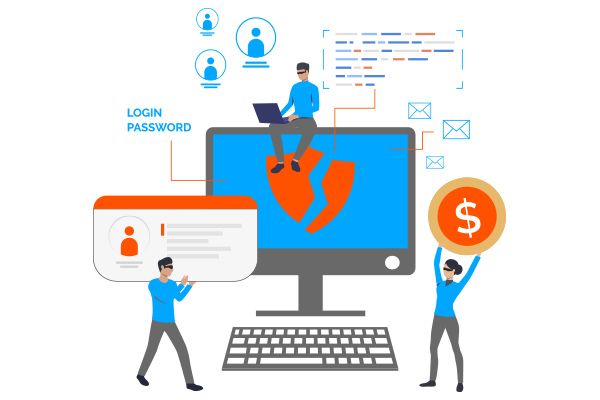Why Data Breach Threats Causes A Risks To Data Security?
Dangers focusing on the various sorts of information can emerge out of your employees, from providers and advisors who approach your system and from people outside your association. They can access your data from inside your network, through outside email accounts, through cell phones and the cloud if your business stores information. General perimeter security is not, at this point, enough to guard your information against these data breach threats.
Information assurance can come up short against insiders. Disappointed representatives may choose to release touchy data. Outer people can utilize messages or noxious sites to introduce malware on worker PCs and get client names and passwords that way. Representatives of your cloud administration provider regularly approach cloud information, email records, and cell phones to be lost, hacked, or traded off. Despite such dangers, organizations need to distinguish the results of relating information breaks and discover arrangements that lessen their security risks.
At the point when organizations consider distributed computing, one of the significant preferences regularly referred to is the way that it can make your business progressively secure. Truth be told, as of late, numerous organizations have decided to relocate to the cloud for its security benefits explicitly. In this way, it may amaze you to discover that various cybersecurity threats can cause a wide range of issues for cloud frameworks.
Top 6 Data Breach Threats For Cloud Security
1. Cryptojacking
Crytojacking is a genuinely new type of cyberattack under the radar. It revolves around the mainstream practice of digging for digital forms of money like Bitcoin. To do this, you need registering power, and cyber criminals have discovered techniques for getting to distributed computing frameworks and afterward utilizing their figuring capacity to dig for cryptographic money.
Cryptojacking can be extremely doubtful about spotting and managing. The significant issue here is the way that when programmers use registering assets from your cloud framework implies your activity will be eased back down. However, it will keep on working. It means it can appear as though nothing pernicious occurs and that maybe the PCs are merely battling with their preparing power. Numerous IT groups ruin the side effects of Cryptojacking as an imperfection with an update or a more slow web association, which means it takes them any longer to build up the genuine issue.
2. Data Loss
Maybe the most widely recognized threat to cloud computing is the issue of breaks or loss of data through information penetrates. An information failure commonly happens when a business is attacked by cybercriminals who can increase unapproved access to the cloud, arrange, or use projects to view, duplicate, and transmit information. If you use cloud computing administrations, an information break can be amazingly harming. However, it can generally happen without any problem. Losing information can abuse the General Data Protection Regulation (GDPR), making your business face defeating fines.
Recollect that information can cause a wide range of issues for your business. Besides the fines and loss of data, you can likewise lose your clients' trust or even have your licensed innovation taken.
3. Inside Threat
At the point when we consider cybersecurity challenges, we regularly review the idea of criminals hacking into our frameworks and taking information – in any case, some of the time, the issue begins from within the organization. Late analyses recommend that insider assaults represent an excess of 43 percent of all information penetrates.
Insider threat can be vindictive. It is significant, at that point, to furnish your team with preparing, and guarantee that you are following the conduct of workers to ensure that they can't perpetrate violations against the business.
4. Service Issues
One of the most harmful dangers to cloud computing is a Disavowal of Administration (DoS) assault. These can shut your cloud administrations and make them inaccessible both to your clients and clients, yet additionally to your staff and business in general.
Cybercriminals can flood your framework with a lot of web traffic that your servers cannot adapt. It implies the servers won't cushion, and nothing can be accessed. If the entire framework runs on the cloud, this would then be able to make it strange for you to deal with your business.
5. Unauthorized Applications
Here and there, it tends to be the situation that your framework is exceptionally secure. Outsider administrations, for example, applications, can introduce genuine cloud security challenges, and you ought to guarantee that your group or digital security specialists set aside the effort to build up whether the application is reasonable for your system before they have it introduced. It would help if you made it fundamental for the IT group to affirm any application before it is introduced on the framework. While this may appear to be a protracted advance to set up, it can successfully remove the danger of uncertain applications.
6. Account Hacking
Maybe the best danger to a business that utilizations distributed computing advancements in the test of hacked accounts. If a criminal can access your framework through a staff account, they might have full access to the entirety of the data on your servers without you in any event.
Cybercriminals use methods, for example, secret key splitting and phishing messages to access accounts. The key here is to give your group the preparation to see how to limit the danger of their record is seized.
To forestall cyber security risks, it is not, at this point, adequate to have an introduction about phishing messages and setting an unbroken secret key from the IT group when another person joins the business. It engages undertakings to make organized cloud preparing plans at scale with a wide assortment of substance that conveys the hypothesis, specific information, and hands-on training.

